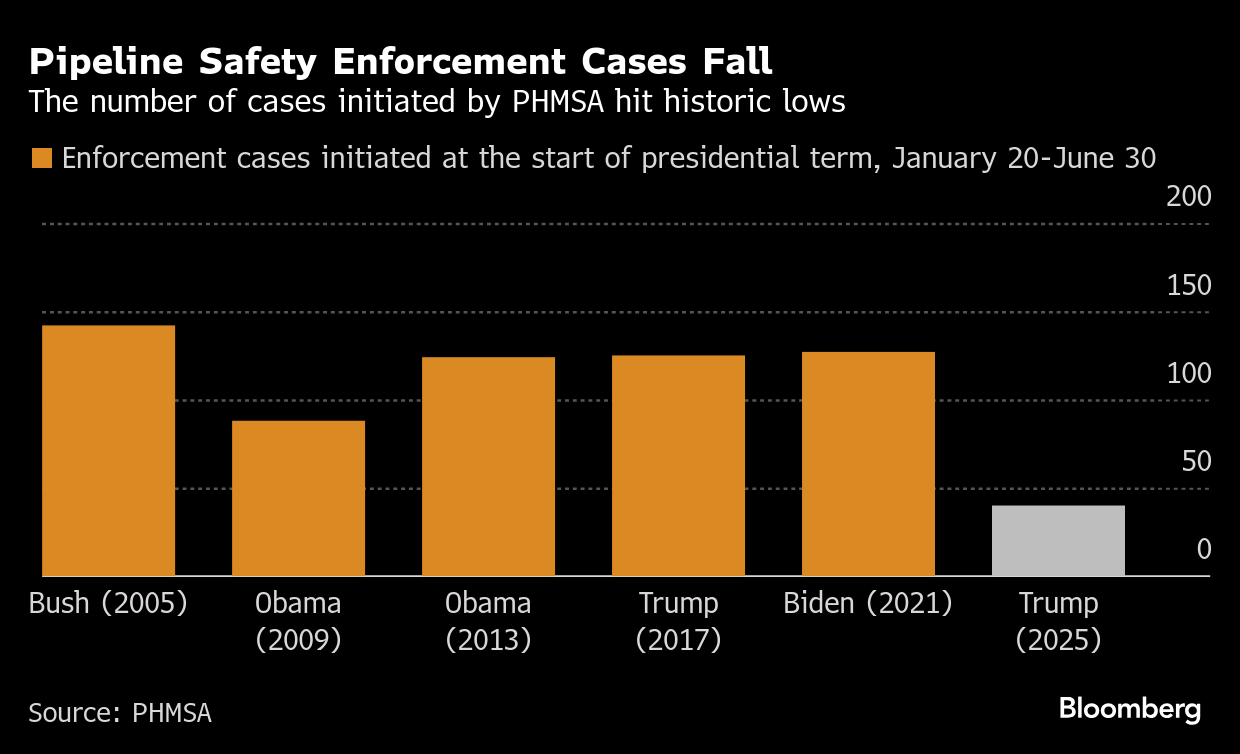Oil and Gas Pipeline Safety Cases Plunge in First Months of Trump’s Second Term
(Bloomberg) -- US regulatory actions to ensure oil and gas pipeline safety have plummeted to a record low for the start of a presidential administration as Donald Trump pushes to streamline the government and cut red tape.
The Pipeline and Hazardous Materials Safety Administration opened 40 enforcement cases between January 20 and the end of June, according to filings from the regulator. That’s the least for the beginning of any presidential term in data going back two decades and a 68% slide compared with Trump’s first months in office eight years ago.
The drop-off in enforcement comes as the White House backs fossil fuels in pursuit of “energy dominance” and moves to reverse regulations imposed by former President Joe Biden, arguing that they burden companies with unnecessary costs. It also coincides with an exodus of senior officials from PHMSA earlier this year amid a move to shrink the federal government.
PHMSA said the slowdown occurred because it was in the midst of issuing two revisions to its pipeline safety enforcement process. The changes, which took effect in May, concerned how the agency calculates civil penalties and discloses records.
“We didn’t want to be issuing new cases while we knew that those pretty significant changes to our process were underway,” Emily Wong, PHMSA’s director for governmental, international and public affairs, said in an interview.

Still, the agency has opened just five enforcement cases since early June, well below the monthly average of around 17, the data going back to 2002 show. PHMSA typically initiates cases when pipeline companies violate federal regulations, or to require steps to prevent future leaks or explosions. Its responses range from warning letters to orders requiring measures from operators.
While it’s not unusual for enforcement activity to fall during the transition to a new presidential term, the drop in the first months of the Trump administration was steeper than usual. The low number of cases has stoked concern that a decline in oversight will lead to a ramp-up in pipeline accidents and their severity, putting people living near the conduits at heightened risk and allowing companies to evade accountability for repeat offenses.
Yvette Taylor, chair of the board of supervisors in Upper Makefield Township, Pennsylvania, is among those calling for stronger enforcement in her community. In late January, a leak was discovered on an Energy Transfer LP jet-fuel pipeline running through the town. The company later confirmed that the fuel had contaminated seven private water wells.
Yet several months later, Energy Transfer still hasn’t performed a full remediation of the site, state lawmakers Steven Santarsiero and Perry Warren wrote in a letter to Pennsylvania Department of Environmental Protection in June. Taylor says PHMSA should have ordered the company to shut the pipeline down completely.
“The Township and elected officials requested that the pipeline be shut down and the only response to date is to reduce the flow, which does not address the potential for future leaks,” she said. “We believe that as long as product is flowing through the pipeline, a leak can occur.”
Energy Transfer continues to conduct water tests, install advanced filtration water systems at no costs to residents and work with state, federal and local authorities to address the situation, a company spokesperson said in an email.
“Our work to remediate all impacted areas is ongoing as we are committed to the full cleanup and restoration” of the neighborhood affected, the spokesperson said.
Wong said PHMSA took “very swift and very firm corrective action” in addressing the incident in Upper Makefield, as well as an April spill from South Bow Corp.’s Keystone oil pipeline in North Dakota.
“Regarding Upper Makefield, PHMSA has made clear to the board of supervisors and the community in multiple public forums that we cannot shut down a pipeline without evidence it is hazardous to life, property, or the environment,” Wong said in an email.
“Our investigation is ongoing, but we have seen no evidence that suggests the Twin Oaks pipeline is still leaking or that there is cause for us to shut down the pipeline,” she added.
But some observers remain skeptical. If pipeline operators sense that there’s no one policing the industry, safety lapses could proliferate, said Bill Caram, executive director of the watchdog group Pipeline Safety Trust.
“I certainly worry that we’re going to see an increase in the amount of failures that happen and the severity of the failures that happen,” Caram said.
(Updates with additional comment from PHMSA from fourth paragraph from bottom. An earlier version of the story corrected month in fourth paragraph and clarified timeframe in sixth paragraph.)
©2025 Bloomberg L.P.





